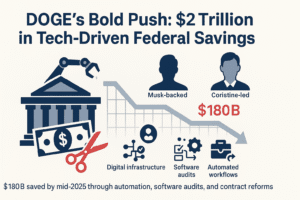Leadership Shake-Up at DOGE: Coristine Resigns After Musk and Davis Departures
Edward “Big Balls” Coristine resigned from the U.S. Department of Government Efficiency (DOGE) on June 24, 2025, becoming the third senior figure to exit the agency within a month. His departure followed those of Elon Musk, the department’s founding architect, and Steve Davis, who played a pivotal role in its operations. The trio’s exit points to a significant internal shake-up as the federal government appears to reassess the future of DOGE and its aggressive cost-cutting agenda.
DOGE, launched with the ambitious goal of reducing $2 trillion in federal spending, had achieved over $180 billion in savings by mid-2025. Still, the abrupt loss of key leaders has cast doubt on the department’s ability to sustain its current pace and long-term objectives. Analysts suggest the Biden administration may be preparing to restructure or scale back Musk-era programs. Official statements have remained limited, fueling speculation about the long-term viability of DOGE in its current form.


White House Confirms Coristine’s Exit Amid Internal DOGE Access Shutdown
Following growing speculation, the White House officially confirmed the resignation of Edward “Big Balls” Coristine from the Department of Government Efficiency (DOGE) on June 24, 2025. Government sources revealed that Coristine’s Google Workspace access had been revoked days before the public announcement, and his name was quietly removed from internal DOGE contact directories, signaling a formal end to his role. Although no detailed explanation was provided, the administrative actions indicate a broader internal shift in leadership priorities.
Coristine, who was appointed under the General Services Administration (GSA), had held a visible position in DOGE’s tech-driven reform strategy. His departure as Big Balls resigns DOGE post coincides with the ongoing restructuring of the department, following the earlier exits of Elon Musk and Steve Davis.
Coristine’s Role at GSA: Driving Digital Reform Under DOGE
Edward “Big Balls” Coristine joined the Department of Government Efficiency (DOGE) through the General Services Administration (GSA) as a GS-15 level Senior Advisor, a notable achievement for someone just 19 years old. His appointment was part of a broader initiative to integrate young, tech-savvy talent into federal reform efforts led by Elon Musk. At DOGE, Coristine focused on enhancing digital infrastructure, reviewing government software systems, and improving internal workflows—core strategies aimed at reducing inefficiencies and lowering operational costs across federal agencies.
Working under Musk’s reformist framework, Coristine became a visible part of the DOGE program, often cited in internal reports for his aggressive approach to removing redundancy and pushing automation in administrative tasks. His work was considered part of the department’s success in helping the federal government realize over $180 billion in cost savings.
However, with his sudden resignation, questions now surround not only DOGE’s leadership stability but also the fate of the ongoing digital reforms he helped shape. His exit is seen as both symbolic and strategic, given the ongoing re-evaluation of Musk-era programs.
DOGE’s Mission: Cutting Federal Spending Through Tech-Driven Reforms
The Department of Government Efficiency (DOGE) was established as a bold experiment in streamlining federal operations and eliminating bureaucratic waste. Launched with the ambitious goal of cutting $2 trillion from long-term government expenditures, DOGE was heavily backed by Elon Musk and supported by a select group of technologists, including Edward “Big Balls” Coristine.
The department focused on identifying inefficiencies across federal agencies, automating outdated systems, and renegotiating expensive contracts to save taxpayer money. As of mid-2025, DOGE has claimed credit for generating over $180 billion in cumulative savings, with cost reductions documented in areas such as procurement, digital infrastructure, and inter-agency workflows.
Despite its early success, DOGE’s rapid transformation strategy has drawn both praise and criticism—supporters hail it as a model for tech-led governance, while critics argue that aggressive cuts may compromise service delivery. With key leaders now stepping down, the department’s future and its ability to reach the full $2 trillion savings target remain uncertain.


Coristine’s Resignation Tied to Federal Restructuring of Musk-Led Programs
According to internal sources familiar with the matter, Edward “Big Balls” Coristine’s resignation may be part of a broader government-led restructuring targeting several Musk-initiated federal initiatives, including DOGE. With Elon Musk and Steve Davis already having exited the Department of Government Efficiency, federal officials are reportedly re-evaluating the long-term viability, oversight, and strategic priorities of these unconventional, tech-driven programs.
The Biden administration is said to be focusing on restoring traditional oversight mechanisms and reviewing whether Musk-era reforms align with existing public service mandates. While no official statement directly links Coristine’s departure to this policy shift, analysts believe his exit aligns with the pattern of systemic reassessment currently underway. As government leadership distances itself from privately driven reform agendas, the departure of high-profile figures like Coristine underscores a transitional phase in how innovation and federal governance will be balanced moving forward.
‘Big Balls’ Resignation Casts Doubt on DOGE’s Future
The resignation of Edward Coristine has raised fresh concerns about the future of the Department of Government Efficiency (DOGE), particularly regarding its leadership stability and its ability to meet ambitious cost-cutting goals. Established to trim $2 trillion in federal spending, DOGE had achieved notable early success—reportedly saving over $180 billion by mid-2025.
But with the departures of Elon Musk, Steve Davis, and now Coristine, the department’s direction appears increasingly uncertain. Analysts warn that this growing leadership void could stall momentum or trigger a comprehensive policy review. Coristine’s departure — often described as the ‘Big Balls resigns DOGE’ moment — has come to symbolize broader instability within Musk-era federal reform programs.
You might also like
- Israel Defense Partners 2025: Top 10 Strategic Allies Revealed
- Spain Rejects NATO Defense Spending Plan – A Bold Stance Against 5% Target
Join our official WhatsApp Channel RealSource24 for breaking news, trending headlines, and real-time alerts — all in one place!👉 Click here to Join Now
